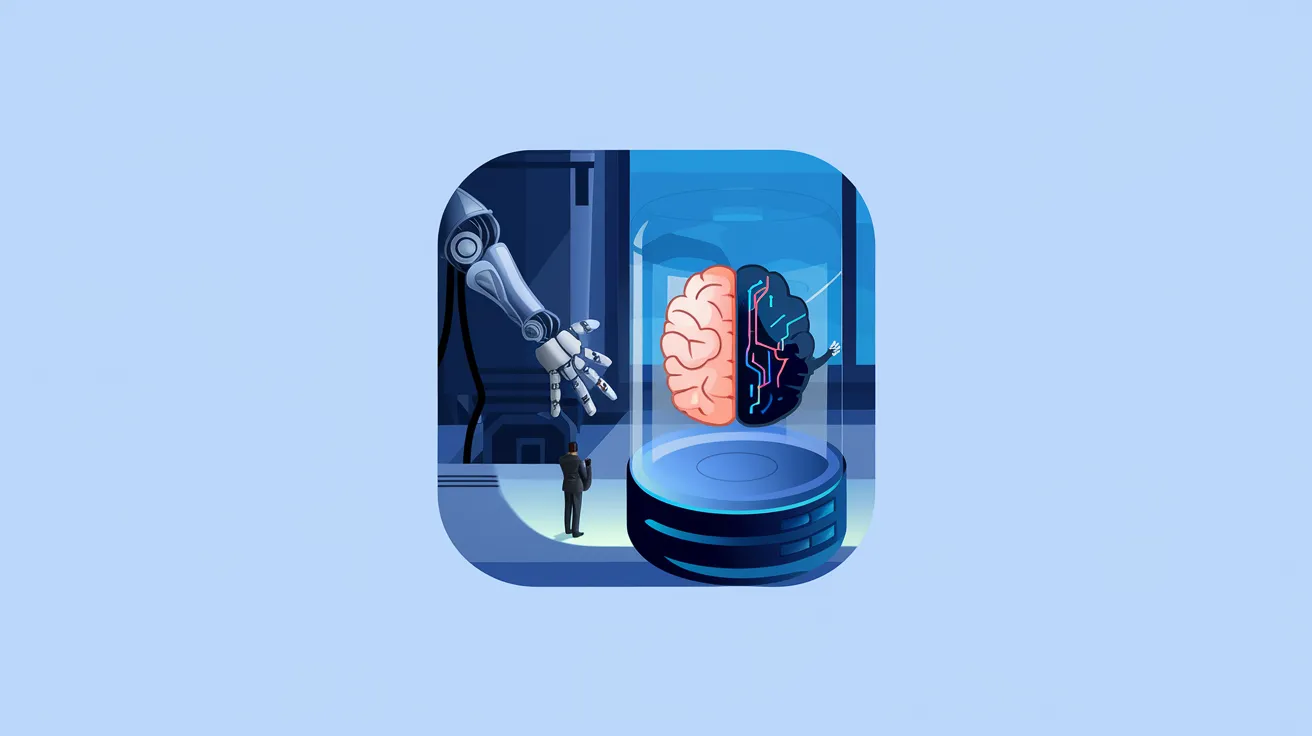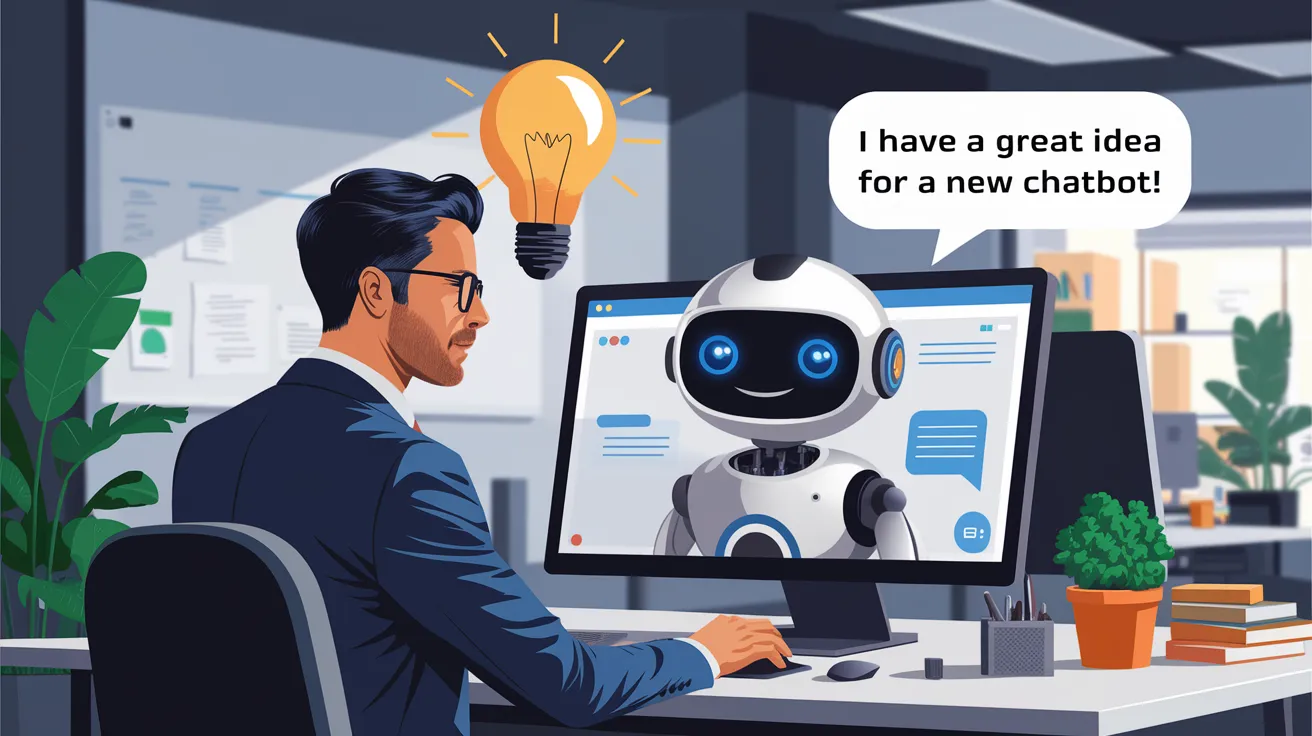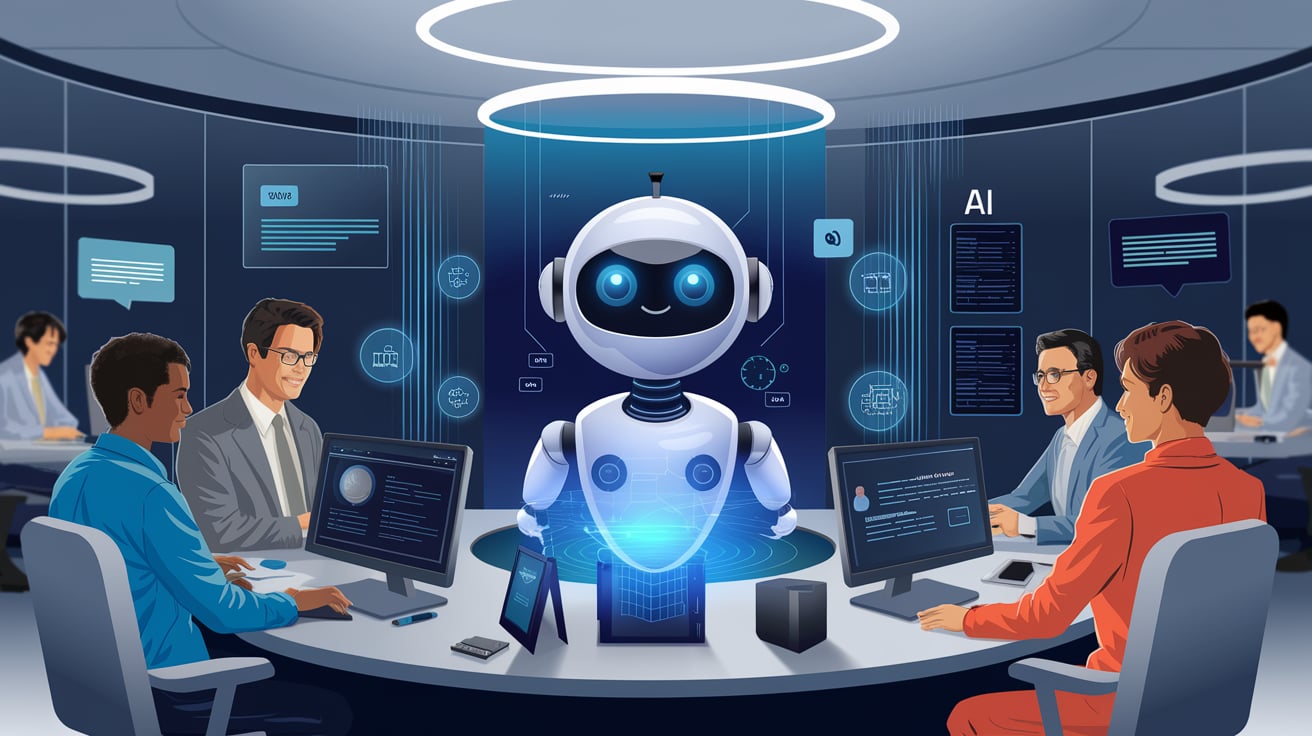2025 Trends in AI Chatbots for Marketing and Sales
Discover the latest trends in AI chatbots shaping marketing and sales in 2025. I explore how businesses leverage conversational AI to boost engagement and drive growth.
Posted by


Anastasiya Dovhopola
Product Growth Manager
2025 Trends in AI Chatbots for Marketing and Sales
I was talking to a virtual agent the other day. It was about a delivery issue. The agent made a joke about my postcode being hard to find, like a unicorn. I laughed, seeing how far AI chatbots have advanced.
We're moving away from robotic answers and frustrating loops. Now, conversational AI is changing how we talk to customers and make business decisions.
The world of smart chatbots is changing fast. In 2023-2024, AI use in marketing jumped to 72%. Marketing and sales are leading this change. The AI in marketing market is expected to reach $82 billion by 2030, growing 25% every year.

North America is leading with a 32.42% market share in AI marketing. But it's not just about numbers. AI assistants are getting better at understanding us, like humans. They can grasp context, feelings, and even cultural differences.
They're not just answering questions. They're having real conversations, predicting what we need, and boosting sales in ways we never thought possible.
Looking ahead to 2025, AI chatbots will change how businesses talk to customers. We'll see better natural language processing and voice integration. The future of marketing and sales is bright, smart, and very responsive. Let's explore what's coming and how it will impact businesses and customers.
The Current State of AI Chatbots in Marketing and Sales
AI chatbots are changing how we market and sell. I've seen a big increase in chatbot use. Businesses are using these AI-powered virtual assistants to improve how they talk to customers. Let's look at some numbers that show how fast this field is growing.
Market Size and Growth Statistics
The global chatbot market is growing fast. By 2024, it's expected to reach $994 million. And it could even grow to $102.26 billion in the future. This growth comes from more businesses using chatbots and seeing their benefits.
Adoption Rates Across Industries
Chatbots are being used in many areas. I've seen that 58% of B2B companies use chatbots, while 42% of B2C do, but I am sure this numbers will increase for AI sales chatbots. The top industries using them are education, B2B, B2C markets, real estate, travel, healthcare, e-commerce, finance and much more from small businesses to enterprises.
Key Market Leaders and Solutions
Top companies are focusing on making chatbots better for users and improving analytics. They're creating solutions that not only answer questions but also help qualify leads and boost sales. In fact, businesses using AI chatbots see their conversion rates triple compared to traditional website forms.
The chatbot revolution is in full swing. With 88% of users having chatbot conversations and 69% being satisfied, it's clear these AI assistants are here to stay. As we move forward, we'll focus on better chatbot analytics and user experiences to meet business and consumer needs.
Trends in AI Chatbots: A 2025 Perspective
I'm excited to share more predictions of chatbot innovations we can expect in 2025. AI sales chatbots will change how we interact with customers using advanced natural language processing. They will understand complex human languages better, responding with improved contextual awareness.
Sales chatbots are becoming more human-like, aiming to make customer interactions more engaging and natural, so the sales will not be pressure but will be a pleasure for both sides. They're learning to recognize emotions and adapt, making conversations feel more personalized.
One of the most promising chatbot innovations is multimodal interactions. These AI agents use text, voice, and visual inputs, making customer interactions more efficient.
"AI chatbots in 2025 will offer hyper-personalization, leveraging user data for tailored responses and recommendations."
The integration of chatbots with generative AI models is taking conversational experiences to new levels. These AI sales chatbots provide creative responses and dynamic conversations, pushing personalization to new heights.
Industry | Chatbot Application | Expected Impact |
|---|---|---|
Healthcare | Patient Support | Improved care coordination |
Legal | Legal Assistance | Streamlined case management |
Real Estate | Property Recommendations | Enhanced client matching |
Looking ahead to 2025, AI chatbots will be key in changing how we interact with customers across industries.
The Evolution of Natural Language Processing in Sales Conversations
I've seen a big change in how AI chatbots handle sales talks. Natural language processing has grown a lot. Now, it turns dialogue systems into strong tools for businesses. These advanced language models understand context, emotions, and intent very well to catch signals from customers when they are ready to buy or understand visitor needs to convert them to the customer, overall with AI we improved chatbot user experience.
Advanced Context Understanding
Today's AI chatbots don't just look for keywords. They study whole conversations, catching subtle hints and references. This deep understanding makes talks more natural and engaging. It's like talking to a salesperson who remembers everything you've said and answers thoughtfully by addressing each of your pain points.
Sentiment Analysis Capabilities
Emotion detection in chatbots has made a huge leap. These systems can now sense a customer's mood and adjust their tone. It's amazing to see how these emotional smarts lead to happier customers and this is even before we have voice-enabled chatbots.
Multilingual Support Features
Language barriers are fading away. AI chatbots offer smooth multilingual support, opening up global markets. It's impressive how these systems can switch languages in the middle of a conversation without a hitch.
NLP Feature | Impact on Sales | Future Prediction |
|---|---|---|
Context Understanding | More personalized interactions | 25% of organizations to use as primary customer service channel by 2027 |
Sentiment Analysis | Improved customer satisfaction | Enhanced emotional intelligence in chatbots |
Multilingual Support | Expanded global reach | Efficient service across diverse markets |
As these technologies keep getting better, I'm looking forward to seeing their impact on sales and customer service. The future of AI in sales talks is very promising. A lot of companies already have chatbot training data and intent recognition features to make their sales agents sound as human as possible and don't push sales but make them easy and quick to close.
AI-Powered Personalization and Customer Experience
I've noticed a big change in how businesses talk to customers. AI chatbot platforms are changing how we connect with people. Now, 84% of customers think the experience a company gives is as important as what they sell, and virtual agents help companies with this mission successfully.
Dynamic Content Adaptation
Chatbot personalization is a big deal. These smart helpers look at lots of data to give custom experiences. For example, 80% of customers are more likely to buy when they feel like they're getting something special.
This is where AI really helps. It changes content on the fly based on what users like and do.

Predictive Customer Behavior Analysis
Customer service chatbots are getting better all the time. They don't just answer questions, they guess what you might want next. By looking at what you've bought and what you've looked at, they can predict your next move.
This makes the customer journey smoother and more enjoyable. The numbers show AI's power. The AI market is expected to reach $407 billion by 2027. And 97% of business owners see AI writing tools as a big plus for their work.
AI Impact | Statistic |
|---|---|
Personalized Experience Impact | 80% increase in purchase likelihood |
AI Market Growth | Projected $407 billion by 2027 |
Business Owner Confidence | 97% believe in AI benefits |
Integration of Voice Technology and Conversational AI
I've seen a big change in how we talk to AI. Now, one of the cutting-edge chatbots is a voice-enabled chatbot that is leading the way. This change will make it easier for businesses to talk to customers without needing to type.
AI assistants are getting better at understanding us, including our feelings. This new tech is helping businesses give personal service to many people at once.
- Advanced Natural Language Understanding (NLU) is making AI better at getting what we mean
- Voice AI chatbots can now sense and match our emotions.
- Working with IoT is changing how we talk to smart devices everywhere
These updates are not just cool, they're changing whole industries. From healthcare to shopping, voice chatbots are making things easier and better for customers, you can test voice interaction by purchasing the Chat GPT premium version or at the Hachly AI website by pressing the microphone icon in the chat with AI agent Ana. They're great when you can't type, like when you're driving or cooking.
"Next-Gen Voice Assistants will become increasingly human-like in their interactions." - Bernard Marr.
It's already happening. By 2025, AI assistants will be even more advanced. They'll handle tough tasks on their own, understand many languages, and know about different cultures.
Feature | Current State | 2025 Projection |
|---|---|---|
Language Support | Limited languages | Multilingual with cultural sensitivity |
Emotional Intelligence | Basic sentiment analysis | Advanced emotion detection and response |
Task Complexity | Simple queries and commands | Complex, multi-step tasks |
As we get into this tech, we must think about ethics and privacy. Companies need to use AI safely and fairly to keep users' trust. The future of voice chatbots and AI is bright, promising to change how we use tech every day.
Strategic Applications in Sales Pipeline Management
AI chatbots are changing the game in sales pipeline management. They are the best for businesses, making lead qualification, sales automation, and analytics better. Let's explore how these tools are changing the sales world.
Lead Qualification and Scoring
AI chatbots are great at qualifying leads. They look at company size, industry, and past buys to score leads. This lets sales teams focus on the best prospects.
In fact, AI can increase lead generation by 40%. It finds top customers by looking at their online actions and demographics.

Sales Process Automation
AI chatbots make sales automation work. They handle outreach, follow-ups, and scheduling meetings. This lets sales reps build relationships instead.
The Lindy platform uses AI agents. They automate CRM updates and note-taking, making the process smoother.
Performance Analytics and Reporting
AI analytics give sales teams valuable insights. They can predict deal success and suggest prices during talks. This leads to better forecasts and decisions.
AI Impact on Sales | Percentage |
|---|---|
Marketing professionals using AI | 74% |
Sales professionals using AI | 43% |
Administrative sales work automated by AI | 40% |
Professionals expecting AI assistance in jobs by 2024 | 69% |
The benefits of AI chatbots in sales are clear. They make things more efficient, improve lead quality, and offer insights. As AI gets better, it's becoming key for sales teams to keep up in today's market.
Privacy, Security, and Ethical Considerations
Chatbot technology has grown fast, with the AI market set to grow by over $994 million in 2024. This growth raises important privacy and security issues.
Data Protection Measures
Keeping user data safe is essential when using chatbots. It's important to encrypt personal information, control access, and ensure secure data transfers. Giving users clear choices about data collection helps build trust.
Compliance Requirements
Chatbot integration must meet strict rules. Developers must tell users the bot is not human and get consent for data use. It's also crucial to have ways to fix errors and know when to call for human help.
Ethical AI Implementation
Ethics in AI chatbots are vital. Training on diverse data helps avoid bias.
By focusing on these areas, we can make chatbots that are not just efficient but also trustworthy and ethical. This way, we can keep the positive growth we've seen, where chatbots saved businesses $11 billion last year.
Conclusion
I've looked into the world of AI chatbots and found it fascinating. The future of AI chatbots is changing fast. Voice interaction is becoming more popular, making up 20% of these trends.
This move towards conversational AI is changing how we use technology. Personalization is a big deal, with 15% of trends focused on better user experiences. The use of AI chatbots with AR and VR is also growing, making up 10% of trends.
Improving security and privacy is also a priority, making up another 10%. As businesses use more custom AI models, the global AI market is expected to grow by 37.7% from 2024 to 2030.
The rise of AI assistants is a big change for 2025. It promises to make businesses and individuals more efficient. Looking ahead to 2025, AI chatbot trends will change marketing and sales.
From new creative AI uses to better security, these changes are making chatbots smarter and more reliable. It's an exciting time for conversational AI, and I'm eager to see what the future holds.
FAQ
What are the current adoption rates for AI in marketing?
By 2023-2024, AI use in marketing has grown to 72%. Marketing and sales lead in its use. About 32% of marketing teams have fully adopted AI. Another 43% are testing it out.
How big is the AI in marketing market expected to be by 2030?
The AI in marketing market is set to hit USD 82,234.0 million by 2030. It's expected to grow at a 25.0% CAGR.
Which region leads in AI adoption within the marketing sector?
North America is ahead in AI marketing adoption, with a 32.42% market share by 2024.
What are some key trends shaping the future of AI in marketing?
Trends include dynamic content and AI in planning. There's also human-AI teamwork and prompt engineering skills becoming essential.
How are AI chatbots revolutionizing customer interactions?
AI chatbot development is changing customer service with advanced NLP and personalization. They offer quick help and can fit into various marketing channels for a smooth experience.
What advancements are being made in Natural Language Processing for chatbots?
NLP is getting better, allowing intelligent chatbots to grasp context and emotions. This makes conversations more natural and empathetic.
How are AI chatbots being used in sales pipeline management?
AI chatbots help in lead scoring and sales automation. They also provide analytics to improve sales performance.
What industries are adopting AI chatbots?
AI chatbots are used in healthcare, finance, retail, and education. For example, Ada helps in healthcare, and Charles Schwab offers financial advice.
How are voice-enabled chatbots changing user interactions?
Voice chatbots offer hands-free use and better accessibility. They make interactions more natural and accessible for all users.
Need more leads from website?
Start free plan today and get your first chatbot up and running in the next 30 minutes!
Sign Up Now